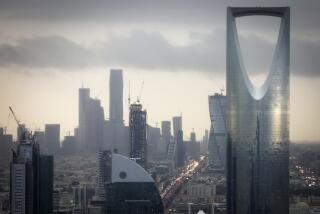Abu Dhabi rescues Dubai with $10-billion bailout
- Share via
Reporting from Cairo and Beirut — Abu Dhabi rescued debt-ridden Dubai on Monday with a $10-billion bailout package that lifted world financial markets but left unclear how the glittering emirate by the sea would recover from investors’ jitters and a troubled real estate market.
The plan provides $4.1 billion to repay a bond that matured Monday for developer Nakheel, which is controlled by state-owned Dubai World. The intervention by oil-rich Abu Dhabi, the most influential state in the United Arab Emirates, was an attempt to save its fellow emirate and to prevent a prolonged financial crisis from rippling across the region.
“We are here today to reassure investors, financial and trade creditors, employees, and our citizens that our government will act at all times in accordance with market principles and internationally accepted business practices,” Sheik Ahmed al Maktoum, chairman of Dubai’s Supreme Fiscal Committee, said in a statement.
“Dubai is, and will continue to be, a strong and vibrant global financial center. Our best days are yet to come.”
World markets rose on the news. Hong Kong’s Hang Seng index gained 0.8% and China’s Shanghai index climbed 1.7%. The FTSE 100 index of leading British shares was up 1%, as was the German DAX.
Abu Dhabi’s market jumped 7.4%. The Dubai Financial Market’s main index surged in early trading by 10.1%, the biggest gain in months for a market that had lost about 26% of its value since Nov. 25, when Dubai announced that it wanted to delay debt payments. The move jolted investors and marred the reputation of the emirate, whose brash style was epitomized by palm-tree-shaped islands and the world’s tallest building.
“We’ve known that Nakheel was in difficulty and that Dubai World would have to restructure its debt,” said Simon Williams, chief economist at HSBC Middle East, based in Dubai. “There’s been some damage done by how the process has been handled, but we are now where I expected us to be a few months ago.
“You have to recognize that Dubai still has a major debt overhang to deal with, especially in the real estate sector, and international attitudes toward Dubai will be cautious,” he added. “But you need to remember there is a real economy here.”
The $10-billion package was the second time this year the fiscally conservative Abu Dhabi, the UAE’s capital, offered financial assistance to spendthrift Dubai. Tensions between the two emirates have grown recently, and some analysts predict that the rescue plan may give Abu Dhabi more leverage over Dubai’s customs, banking regulations and foreign policy, notably its close ties to Iran, which run counter to other Arab nations in the Persian Gulf.
“There has to be a return for Abu Dhabi’s investment; this is not a free lunch,” said John Sfakianakis, chief economist with BSF-Credit Agricole Group. He added: “It will be music to the ears of the U.S. and those who want to see more control over Dubai’s trade and foreign policy.”
Dubai is about $80 billion in debt, including $60 billion of it held by Dubai World.
The Dubai government said in a statement that after repaying the $4.1-billion bond, it would use the remaining bailout money for Dubai World’s “interest expenses and company working capital through April 30, 2010.”
Lutz is a special correspondent.
More to Read
Inside the business of entertainment
The Wide Shot brings you news, analysis and insights on everything from streaming wars to production — and what it all means for the future.
You may occasionally receive promotional content from the Los Angeles Times.











